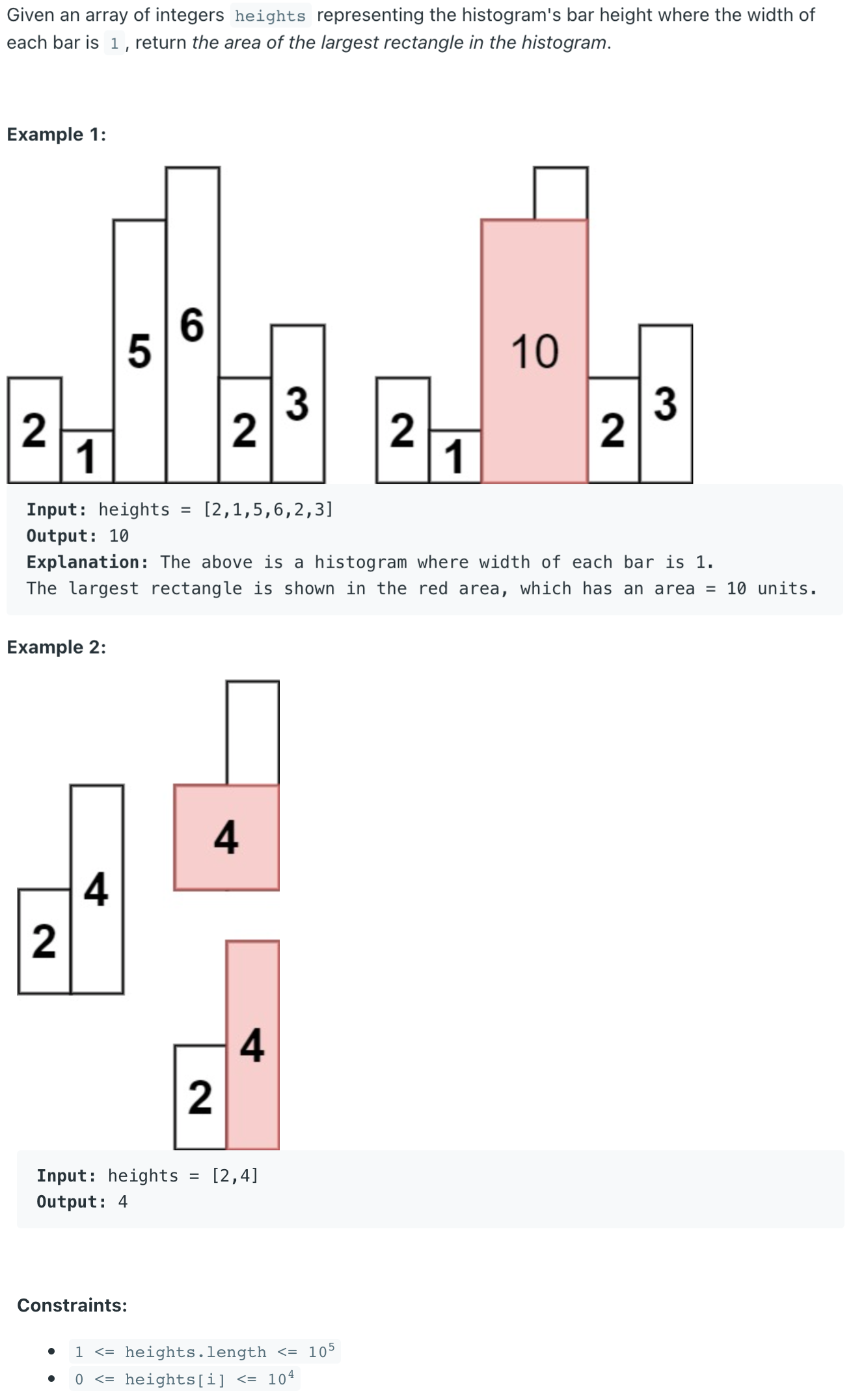Largest Rectangle in Histogram
franklinqin0 ArrayStack

# Solution
Let be the length of the array.
All the following solutions have linear space complexity.
# Width Enumeration
Expand horizontally around each width.
def largestRectangleArea(self, heights: List[int]) -> int:
n = len(heights)
res = 0
for left in range(n):
min_height = sys.maxsize
for right in range(left, n):
min_height = min(min_height, heights[right])
res = max(res, (right-left+1)*min_height)
return res
1
2
3
4
5
6
7
8
9
10
2
3
4
5
6
7
8
9
10
# Height Enumeration
Expand vertically around each height.
def largestRectangleArea(self, heights: List[int]) -> int:
n = len(heights)
res = 0
for i in range(n):
height = heights[i]
left = right = i
while left-1>=0 and heights[left-1]>=height:
left -= 1
while right+1<=n-1 and heights[right+1]>=height:
right += 1
res = max(res, (right-left+1)*height)
return res
1
2
3
4
5
6
7
8
9
10
11
12
2
3
4
5
6
7
8
9
10
11
12
The above 2 solutions take squared time, whereas the following solutions using monotonic stack take only linear time.
# Vanilla Monotonic Stack
left: 1st coordinate to the left with height heights[left] < heights[i].
right: 1st coordinate to the right with height heights[right] < heights[i].
Sentinel nodes of -1 and n are added to stack.
def largestRectangleArea(self, heights: List[int]) -> int:
n = len(heights)
left = [0 for _ in range(n)]
right = [0 for _ in range(n)]
res = 0
stack = [-1]
for i in range(n):
while len(stack)>1 and heights[stack[-1]]>=heights[i]:
stack.pop()
left[i] = stack[-1]
stack.append(i)
stack = [n]
for i in reversed(range(n)):
while len(stack)>1 and heights[stack[-1]]>=heights[i]:
stack.pop()
right[i] = stack[-1]
stack.append(i)
for i in range(n):
res = max(res, (right[i]-left[i]-1)*heights[i])
return res
1
2
3
4
5
6
7
8
9
10
11
12
13
14
15
16
17
18
19
20
21
22
23
24
2
3
4
5
6
7
8
9
10
11
12
13
14
15
16
17
18
19
20
21
22
23
24
# Optimized Monotonic Stack
when right is enumerated, left is popped from the stack.
def largestRectangleArea(self, heights: List[int]) -> int:
# ensure inv: current height < the height on stack
heights.append(0)
n = len(heights)
res = 0
stack = [-1]
for i in range(n):
while len(stack)>1 and heights[i] <= heights[stack[-1]]:
# 1st height higher than current height
left = stack.pop()
height = heights[left]
width = i - stack[-1] - 1
# update the area
res = max(res, height*width)
stack.append(i)
return res
1
2
3
4
5
6
7
8
9
10
11
12
13
14
15
16
17
18
2
3
4
5
6
7
8
9
10
11
12
13
14
15
16
17
18